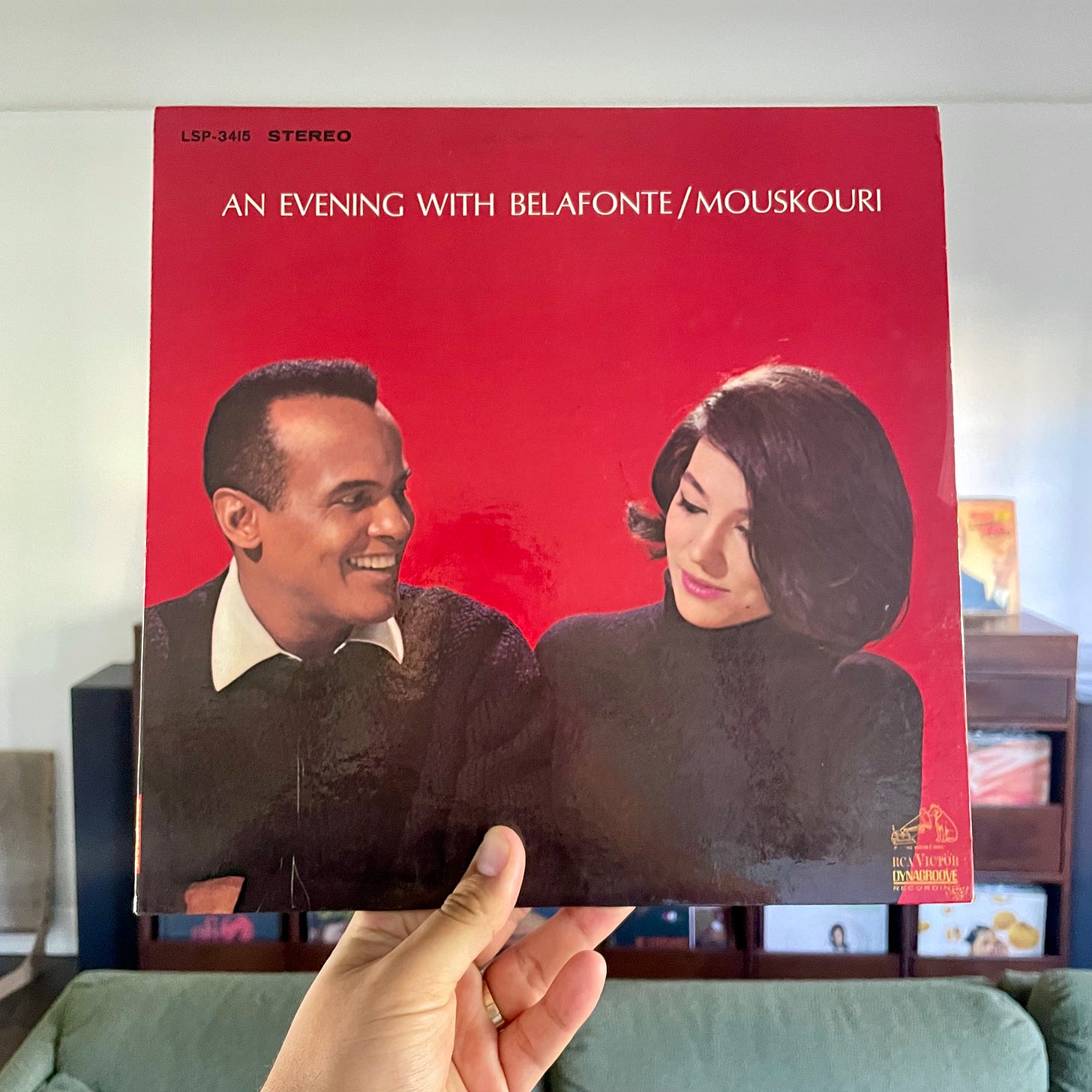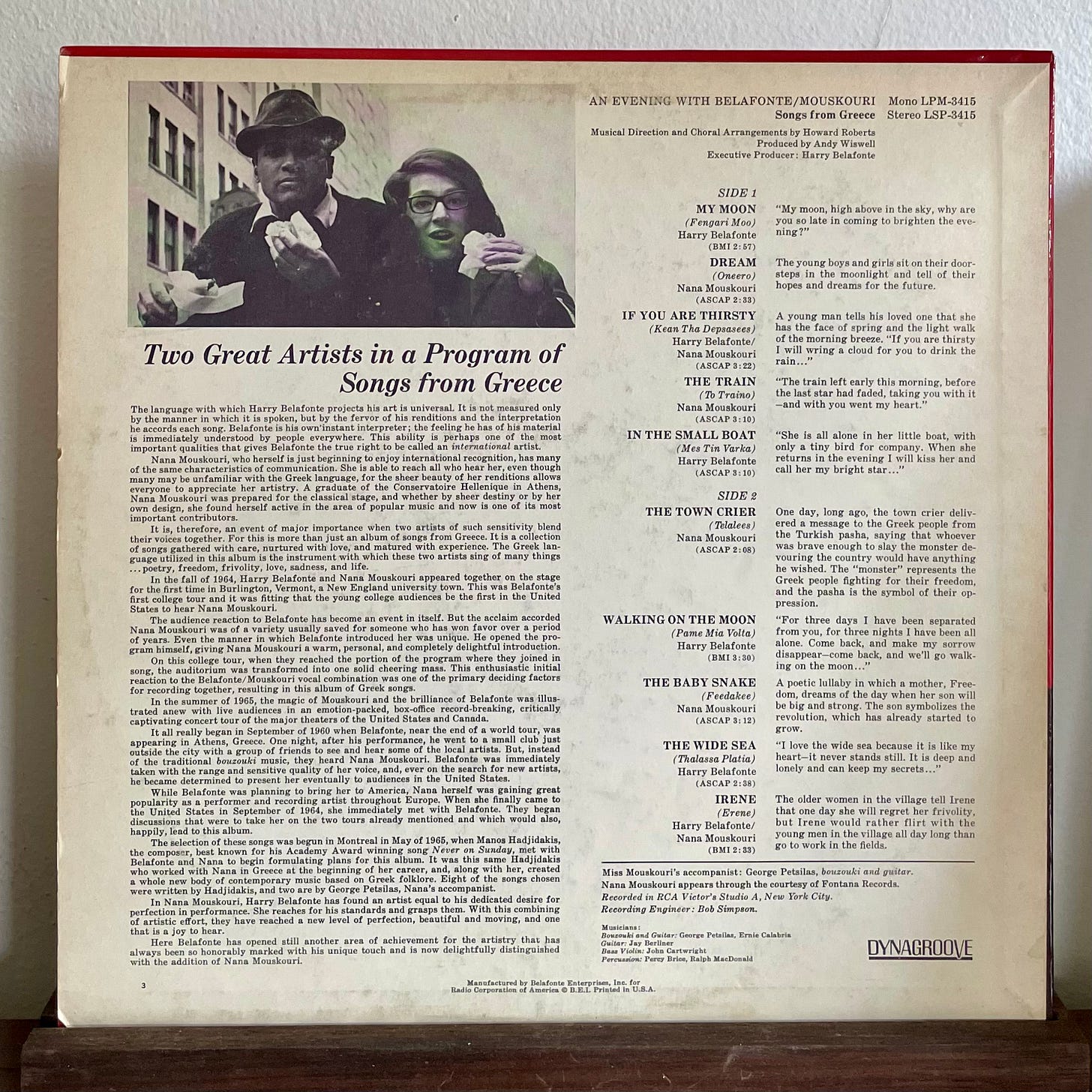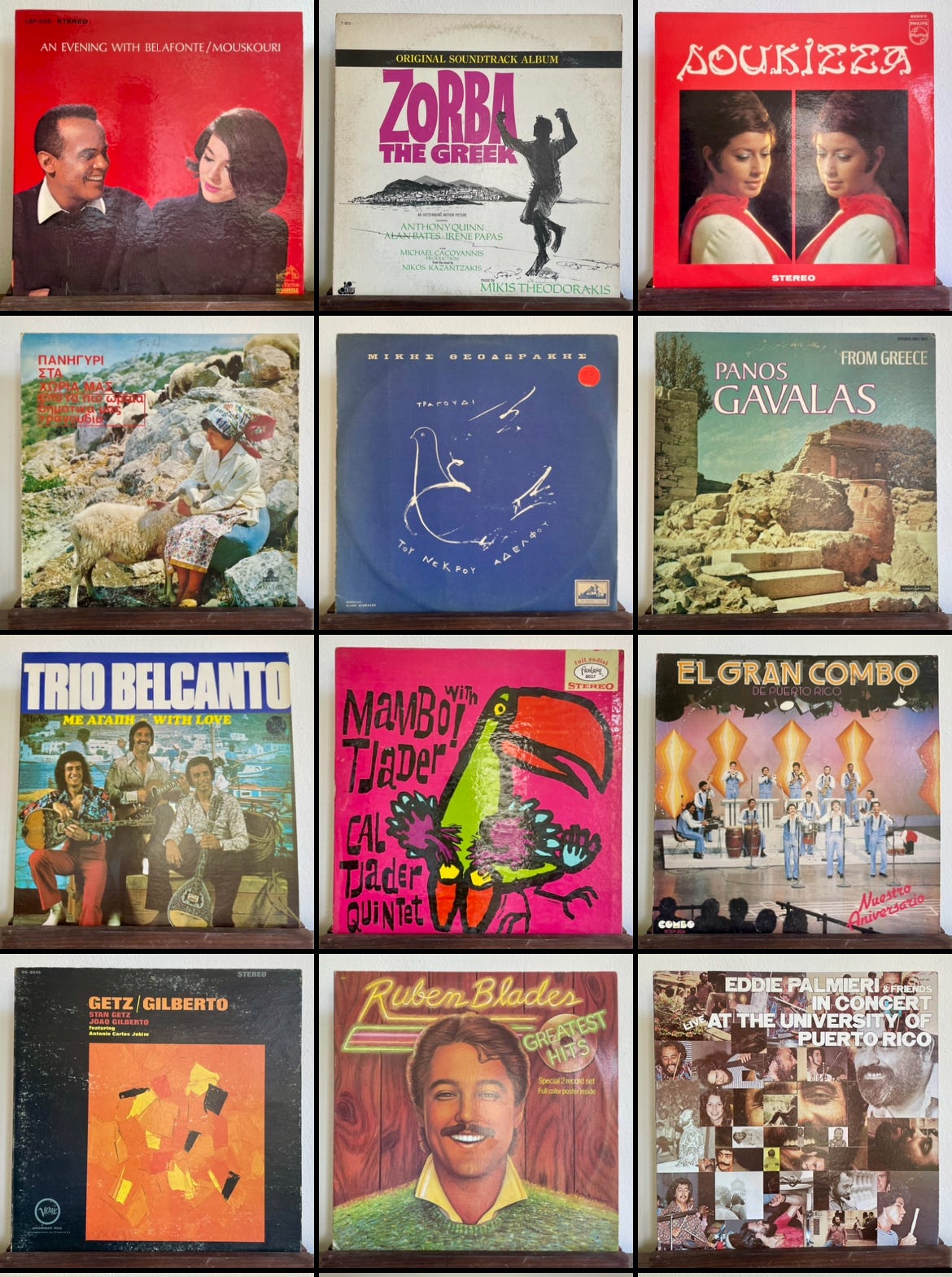The Language of Music
When two people share their respective cultures to collaboratively create something transcendent as seen in Harry Belafonte and Nana Mouskouri's Greek album, plus the next Latin Gold Records Sale!
September is a really big month for me. Back in the day, it was when we would go back to school and celebrate the last true day of summer - Labor Day. Not only is it the month of my birthday but also it’s the birthdays of at least three other family members. It’s also the month of my wedding anniversary when my Latin family officially merged with my wife’s Greek family. Coincidentally, this is somewhat reminiscent of another two people that met and merged their cultures together into one beautiful union.
I am of course talking about the iconic pairing of Harry Belafonte and Nana Mouskouri and their incredibly beautiful, lovely, and unique duet/dueling 1966 album An Evening with Belafonte/Mouskouri.
Millions of people around the world know Harry Belafonte, the legendary calypso singer best known for his songs “Jump in the Line (Shake, Señora)” and “Day-O (The Banana Boat Song)” a.k.a. the song featured in the famous dinner scene in Beetlejuice.
Belafonte was commended around the world up until his death in 2023, and thereafter - rightfully so. He was a rarified EGOT award winner (Emmy, Grammy, Oscar, Tony), a staunch civil rights activist, and a radical liberal humanitarian. Considering all the hardship and racial injustice he experienced as the Harlem-born son of poor Jamaican immigrant parents, Belafonte is an admirable treasure for not just overcoming the trials and tribulations of life but for actually trying to make it better for the world around him.
One of his most important contributions to culture was notably in introducing fresh, new artists to mainstream audiences. Utilizing his voice and platform, Belafonte had a passion for working with undiscovered artists from around the world. He worked with other Black artists such as Miriam Makeba, Ella Fitzgerald, and Odetta, and for a short period of time, he also worked with another renowned singer - Nana Mouskouri.
Greek singer and politician Nana Mouskouri wasn’t always destined for pop stardom, but some key decisions (or destiny) in her life lit the path that led to her meeting Belafonte. In her youth, Mouskouri sang classical music at the Athens Conservatoire. However, after eight years at the Conservatorie, she was encouraged by her friends to start singing jazz. One of her professors found out and barred her from performing and taking the end of year exams as it was not in line with her classical study. Forced to leave the Conservatoire to pursue her passion, Mouskouri began performing jazz in Tzaki clubs and eventually performed on Eurovision, where she began to be noticed. This moment led to her recording the soundtrack for a German documentary about Greece, which garnered here one of her first hit singles.
Mouskouri then moved to Paris and bounced around Europe before landing in New York in 1962 at the behest of one Quincy Jones. By this point in the late 50s/early 60s, Mouskouri was becoming prominently known for singing in French - and Spanish - and a multitude of other languages as she had a rare accent that could fit any language. In fact, “over the span of her career, she has released over 200 albums in at least twelve languages, including Greek, French, English, German, Dutch, Portuguese, Italian, Japanese, Spanish, Hebrew, Welsh, Mandarin Chinese and Corsican” (Wikipedia via AllMusic). Her voice was universal, which would be the key element in her meeting Belafonte.
The back sleeve of the aforementioned LP An Evening with Belafonte/Mouskouri has a lot of key information on how this album and pairing came to be. One line really stuck out to me as it was seemingly a small moment in time that seemed to pave the way for her future.
“It all really began in September of 1960 when Belafonte, near the end of a world tour, was appearing in Athens, Greece. One night, after his performance, he went to a small club just outside the city with a group of friends to see and hear some local artists. But, instead of the traditional Bouzouki music, they heard Nana Mouskouri. Belafonte was immediately taken with the range and sensitive quality of her voice, and ever on the search for new artists, he became determined to present her eventually to audiences in the United States.”
The biggest events in life can often sprout from the smallest of moments. Imagine Harry Belafonte, young and dapper, going out for a night in Greece with friends and enterting a taverna. They are probably drinking ouzo or metaxa (or maybe Greek coffee), laughing, and eating souvlaki or spanikopita, and all the sudden, a voice cuts through the cigarette smoke, and Belafonte turns around to see this young woman in thick-rimmed glasses singing so passionately, so purely, that it makes him stop. It makes time stop.
The subtitle of the album is Songs from Greece as Belafonte and Mouskouri alternate taking lead on songs all sung in Mouskouri’s native Greek language. One would never have thought that Belafonte could sing in Greek, but the Greek alphabet just flows out of his vocal chords like smooth honey lava. It’s a wonder to hear and while you may not understand the words, you inherently identify and feel the emotion. Mouskouri counterpoints him with her increased tenor and operatic notes that try to speak to the Greek gods. Where the album soars is when their voices meld together in duet on songs such as “In A Small Boat”, “The Baby Snake,” and the bouzouki-banger of a final song “Irene.” And my god do they communicate with the heavens on “Irene.” The acoustic guitar creates a forward-driving beat while these two iconoclast singers belt out their lyrics in perfect harmony. The bouzouki cuts in with playful licks that make you want to Greek dance like nobody’s watching.
Mouskouri later on in her career detailed her experience with Belafonte and the difficulty in working with him. At one point, he pushed her to not wear her iconic glasses while performing. She was so upset by it that she threatened to quit unless Belafonte relented on that claim. He did. Despite some of the unfortunate moments that occurred between them, the result of their collaboration did result in one of the most beautiful works created from cultures coming together to speak the universal language of music. His passion and interest in the Greek language, her passion and expertise in singing in the Greek language led to an album sung in a language that people don’t often hear but absolutely should, especially since Greek language and culture has influenced so many other languages, including English. While a listener may not know be able to translate the language, they’ll intuit the emotions conveyed in the caliber of the singing and the tenor of the voices. A listener may not decipher the lyrics, but they’ll feel the tone of the story through the melody, harmony, and rhythm.
That’s proof that music is a universal language, that we can all inherently comprehend something even when we don’t understand it.
GREEK & LATIN RECORD SALE - SATURDAY, MAY 4TH
This weekend, my wife, family, and I will be celebrating Greek Easter on Sunday. It’s the biggest holiday for the Greek community, and it’s full of great traditions like cracking the red eggs for good luck, listening to Greek music, and eating an incredible feast of Greek traditional food with family and friends.
In celebration of the holiday and inspired by Belafonte and Mouskouri’s collaborative album, my record selling venture Latin Gold Records will be hosting a GREEK & LATIN RECORD SALE this Saturday, May 4th at 9AM PST / 12PM EST. Co-curated by my wife, the sale will feature (7) Greek albums from her record collection alongside (5) Latin albums I selected to sell this Saturday morning on the Latin Gold Records Instagram, including our copy of An Evening with Belafonte/Mouskouri for you to spin at home.
As a subscriber of First Pressing, below is your exclusive sneak peek of the full collection going on sale. Mark your calendars and see you on the Latin Gold Records Instagram this Saturday, May 4th at 9AM PT / 12PM ET.
That’s it for this issue of First Pressing. Thanks for reading, Happy Greek Easter to those who celebrate, and Happy Spinning!
Kadrian






I'm late to the party, but thanks for introducing me to this record! I hope you both had a great holiday & that the sale went well!
Thanks so much for featuring this overlooked album.